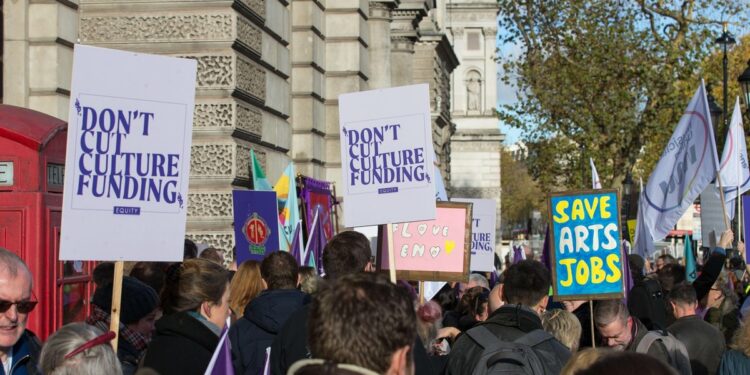A new report published by the University of Warwick and the Campaign for the Arts pressure group paints a bleak picture of arts funding and education in Britain, highlighting that “the UK has one of the lowest levels of government spending on culture among European nations”.
The document, entitled The State of the Arts, is “a health check on the UK’s arts and culture, bringing together vital information and official statistics on arts funding, provision, engagement, education and employment,” the introduction says, adding: “It serves as a stark warning and a call to action for all of us.”
The new document focuses on government support and investment levels between two comparative periods: 2009-10 and 2022-23. Crucially, the UK ranks among the lowest spenders on culture, both as a percentage of GDP and per person, spending around 0.46% on culture (GDP) compared to 0.74% on average in other European countries (Organisation for Economic Co-operation and Development statistics show that Hungary is the top spender with 1.4% allocated to culture). Culture spending per person in the UK is also much lower than the European average ($260 compared to $936 in Iceland).
Between 2009 and 2023, UK state funding for the arts decreased significantly; the Department for Culture, Media and Sport (DCMS)’s core funding of cultural organisations decreased by 18% to only 0.17% of total public spending per person, adds the report, while the Arts Councils’ core government funding decreased by 18% in England, 22% in Scotland, 25% in Wales and 66% in Northern Ireland.
The DCMS is the main public funder of the arts, supporting 15 national museums and galleries based in England; in 2022-23, its core sponsorship (or “grant-in-aid”) totalled £21.93 per person or 0.17% of total public spending per person. Adjusted for inflation, this was 18% less than in 2009-10, say the report authors.
In the meantime, other fundraising strategies have paid off. Over the allotted period, tax relief for the creative industries increased by 649%, for instance. “In 2017-18 this investment exceeded the DCMS’ core funding of cultural organisations for the first time,” the report says.
Crucially the survey also highlights a slump in arts education and employment, with GCSE and A-level entries in arts subjects dropping by 47% and 29% respectively since 2010. “Arts education in England has experienced a significant decline, caused by funding pressures and performance measures, like the EBacc [the EBaccalaureate academic qualification] and Progress 8, marginalising the arts in state-funded secondary schools,” the report says. The EBacc, a performance measure introduced under the Conservative-Liberal Democrat coalition in 2010, scores students in core subjects such as English and mathematics but not arts subjects. Progress 8, which tracks a pupil’s progress from the age of 11 to 16, also places emphasis on English and maths.
The number of arts teachers in English state-funded secondary schools also fell from 55,000 to 40,000, or 27%, between 2011 and 2024.
Last month 21 UK visual arts organisations issued a collective manifesto calling on the future government of the United Kingdom to back the country’s ailing visual arts sector.
Following the Labour victory in the 4 July election, Lisa Nandy was appointed culture secretary. According to The Guardian, she said to DCMS staff: “In recent years we’ve found multiple ways to divide ourselves from one another. And lost that sense of a self-confident, outward-looking country which values its own people in every part of the UK. Changing that is the mission of this department. The era of culture wars is over.”
Source link : https://www.theartnewspaper.com/2024/07/23/uk-spending-on-culture-among-the-lowest-in-europe-says-landmark-report
Author :
Publish date : 2024-07-23 07:00:00
Copyright for syndicated content belongs to the linked Source.




